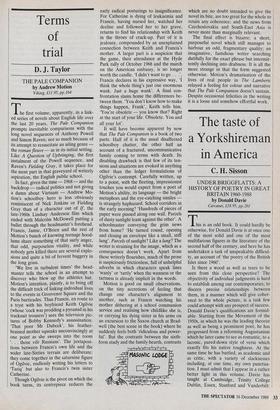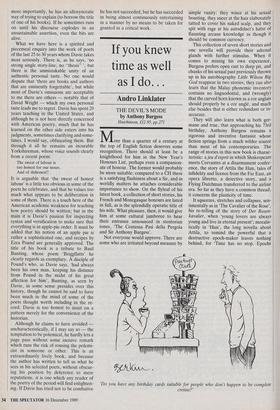The taste of a Yorkshireman in America
C. H. Sisson
UNDER BRIGGFLATTS: A HISTORY OF POETRY IN GREAT BRITAIN 1960-1988 by Donald Davie
Carcanet, £18.95, pp.261
This is an odd book. It could hardly be otherwise, for Donald Davie is at once one of the most solid and one of the most multifarious figures in the literature of the second half of the century, and here he has undertaken a task of unspeakable difficul- ty, an account of 'the poetry of the British Isles since 1960'.
Is there a wood as well as trees to be seen from this close perspective? The objectivity of individual judgments is hard to establish among our contemporaries; to discern precise relationships between them, in a manner which will give coher- ence to the whole picture, is a task few could attempt with any prospect of success. Donald Davie's qualifications are formid- able. Starting from the Movement of the 1950s, in which he was the leading theorist as well as being a prominent poet, he has progressed from a reforming Augustanism which he later came to see as romantic, to a laconic, pared-down style of verse which exactly fits his native toughness. At the same time he has battled, as academic and as critic, with a variety of slacknesses including, at one time, my own punctua- tion. I must admit that I appear in a rather better light in this volume. Davie has taught at Cambridge, Trinity College Dublin, Essex, Stanford and Vanderbilt: more importantly, he has an idiosyncratic way of trying to explain (to borrow the title of one of his books). if he sometimes runs on until his discourse explodes in an unsustainable assertion, even the bits are alive.
What we have here is a spirited and piecemeal enquiry into the work of poets of the last 25 to 30 years whom Davie takes most seriously. There is, as he says, `no strong single story-line, no "thesis" ', but there is the unmistakable unity of an authentic personal taste. No one would dispute that `there are books and authors that are eminently forgettable', but while most of Davie's omissions are acceptable to me there are others — notably that of David Wright — which my own personal taste leads me to regret. Davie has spent 20 years teaching in the United States, and although he is not here directly concerned with American poetry, much that he has learned on the other side enters into his judgments, sometimes clarifying and some- times, I would say, obfuscating them. But through it all he remains an incurable Yorkshireman, whose voice sounds clearly from a recent poem:
The sweat of labour is too honest for our noses.
And of dishonest?
It is arguable that 'the sweat of honest labour' is a little too obvious in some of the poets he celebrates, and that he values too much what appears to be deliberation in some of them. There is a touch here of the American academic weakness for teaching how poetry should be written; but in the main it is Davie's passion for inspecting syntax and versification to make sure that everything is in apple-pie order. It must be added that his notion of an apple pie is rather a sophisticated one, and recipes by Ezra Pound are generally approved. The title of his book is a tribute to Basil Bunting, whose poem 'Briggflatts' he clearly regards as exemplary. A disciple of Pound's who, as Davie says, had always been his own man, keeping his distance from Pound in the midst of his great affection for him', Bunting, as seen by Davie, in some sense presides over this history, though he cannot be said to have been much in the mind of some of the poets thought worth including in the re- cord. Davie is too honest to insist on a pattern merely for the convenience of the historian.
Although he claims to have avoided uncharacteristically, if I may say so — the temptation to be polemical, he hardly lets a page pass without some incisive remark which runs the risk of rousing the polemi- cist in someone or other. This is an extraordinarily lively book, and because the author has written to tell us what he sees in his selected poets, without obscur- ing his position by deference to mere reputations, it is one which any reader of the poetry of the period will find enlighten- ing. If Davie has tried not to be combative he has not succeeded, but he has succeeded in being almost continuously entertaining in a manner by no means to be taken for granted in a critical work.



















































 Previous page
Previous page